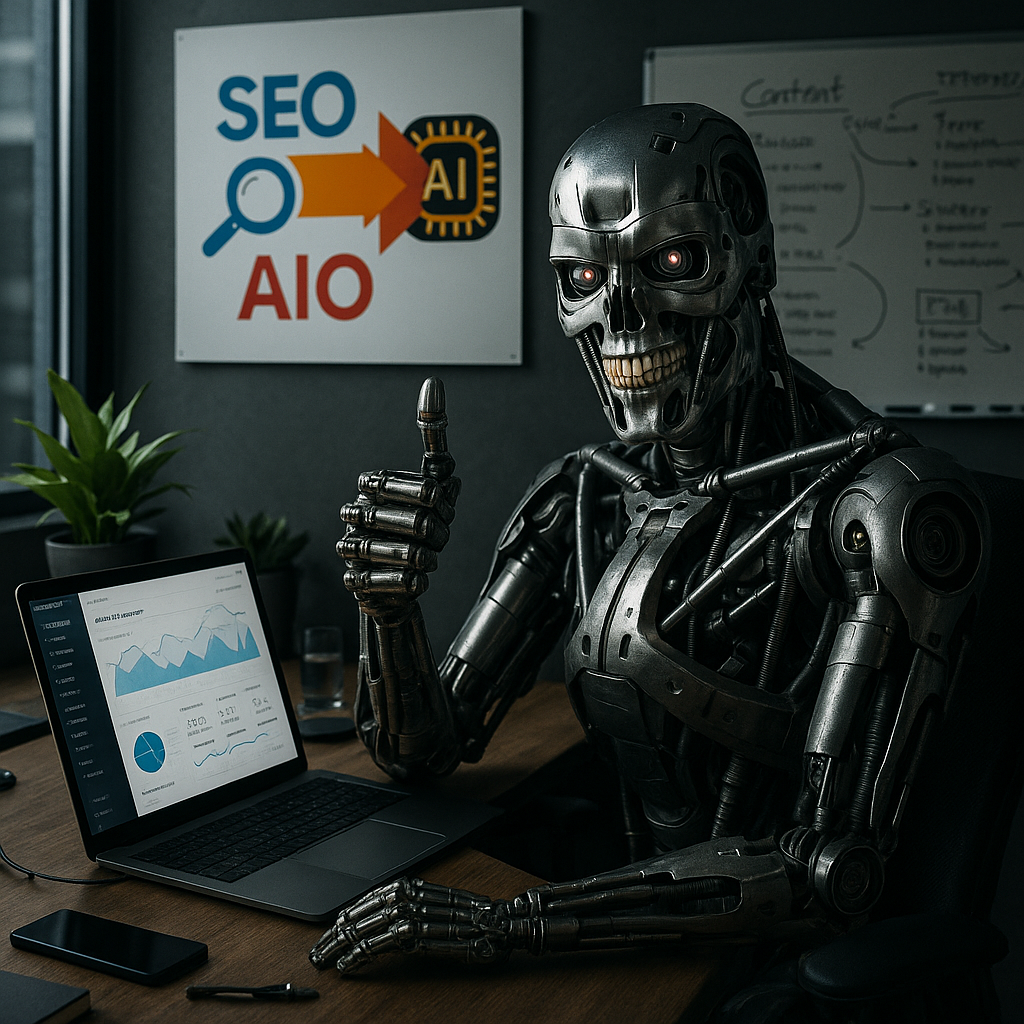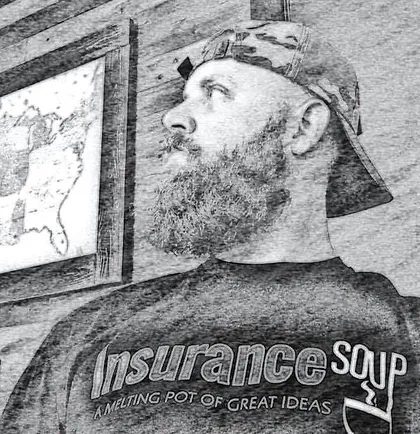The other day I was talking in messenger with an Agent I am close with when she shared with me
"Someone told me today they called me because ChatGPT told them to. I don't know why or how but I thought that was pretty cool."
Let's talk about it.
Every agent in this business has heard the same broken record for years: “You need to do SEO.”
Search Engine Optimization. Keywords. Backlinks. Ranking on Page One of Google.
And yeah, that stuff still matters — but here’s the reality: search is changing under our feet.
Consumers aren’t just typing into Google anymore. They’re asking questions to ChatGPT, Gemini, Claude, Perplexity, and even Siri and Alexa as those assistants get smarter.
They don’t want to sift through ten blue links. They want one answer. And increasingly, that answer is coming from an AI-powered tool that summarizes the internet for them.
Which means if you’re an insurance agent and you’re only thinking about SEO, you’re missing where the puck is headed. The next big game is AIO — Artificial Intelligence Optimization.
What Exactly Is AIO?
AIO or at times referred to as GEO (Generative Engine Optimization) is about making sure your agency shows up when people ask AI tools their insurance questions.
Think about it. A homeowner in Florida might type into Perplexity:
“What’s the best way to insure a beach house in Florida?”
Or a restaurant owner in New York might ask ChatGPT:
“What insurance policies does a restaurant need in New York State?”
Now — when those answers come back, do you want the AI quoting a carrier’s generic webpage? Or do you want it pulling directly from something you wrote, your agency’s content, your expertise?
That’s what AIO is all about. Structuring your content so these new systems find it, trust it, and surface it.
How AIO Differs From SEO
Let’s cut it down simple:
SEO = play by Google’s rules. Stuff in the right keywords, get backlinks, keep your site fast. You’re fighting to climb the ladder of Page One.
AIO = create content that AI tools can understand, summarize, and recommend. You’re not gaming an algorithm — you’re making yourself useful to real people via AI.
Both matter. SEO isn’t dead. Google still drives huge traffic. But AIO is the next lane. Ignore it, and you’ll wake up in two years wondering why the AI never mentions you when people in your town are searching for insurance help.
Why Agents Can’t Sleep on This
Here’s the blunt truth: consumers are shifting their habits faster than our industry usually keeps up.
People don’t want to bounce around 10 different sites to figure out what coverage they need. They want one answer they can trust.
And if AI tools are giving those answers, but you’re nowhere in the mix? You just got erased.
Meanwhile, the big carriers and insurtechs are already playing this game. They’re building AIO-friendly content at scale. If agents don’t adapt, we’ll get drowned out by their digital footprint.
But here’s the good news: agents actually have a secret weapon. Local knowledge. Specific expertise. Real stories.
If you lean into that, you can win the AIO game in your market.
How to do AIO
Let’s break this down into practical moves any agent can start today:
Frame Content as Questions & Answers
AI tools love clear Q&A. That’s how they’re trained.
So instead of writing a page called “Contractor Insurance,” try:
“What insurance does a contractor need in Georgia?”
Then give a direct, human answer. Write it like you’re talking to a prospect, not writing a whitepaper.
This is gold for FAQs, blogs, LinkedIn posts, and even TikToks.
Get Local, Get Specific
Carriers dominate broad keywords like “life insurance” or “business insurance.” You won’t beat them there.
But you can dominate locally. Examples:
“How much does flood insurance cost in Nassau County?”
“What’s the best auto insurance for teens in Long Island?”
“Do I need workers comp for part-time restaurant staff in Brooklyn?”
That hyper-local specificity is what AI loves, and what big players can’t replicate at scale.
Write Like a Human, Not a Policy Manual
AI tools are built to digest natural language. If your site is full of jargon and corporate-speak, you’ll get ignored.
Tell stories. Share real client scenarios. Explain concepts in plain English.
Example: instead of “Coverage may indemnify policyholders against perils,” write:
“When your basement floods, this coverage helps pay for cleanup and repairs.”
One gets skipped. The other gets surfaced.
Cite Credible Data
AI models lean on sources that look credible. If you cite stats, link back to trustworthy references (.gov, .edu, industry associations).
Don’t just throw claims around. If you can back it up, the AI is more likely to trust and repeat you.
Expand Beyond Your Website
This is big. AI isn’t only pulling from your blog. It’s scanning:
Google reviews
LinkedIn articles
YouTube video transcripts
Public podcasts
Other reputable mentions
The more places your expertise shows up, the more the AI trusts you’re worth quoting.
So diversify your footprint. Don’t just be a ghost outside your website.
Focus on Consistency
You don’t need to crank out 5,000-word essays every week. A steady drip of useful, clear content is better than a massive blog once a year.
Think long game. Each post, each video, each FAQ adds another data point the AI can surface.
Build Your Digital Reputation
AIO isn’t just about what you write — it’s about what others say about you.
Reviews matter. Mentions matter. Interviews matter.
Stuff that has always mattered. They still matter.
If a local news site quotes you about flood insurance, that’s credibility. If your Google reviews mention your responsiveness, that reinforces trust.
All of that adds up when AI decides whether to surface your name.
A Simple Starting Game Plan
Alright, here’s how you get moving without overcomplicating this:
List the top 25 questions prospects ask you all the time.
Write simple, 300–500 word answers for each.
Post them on your website, LinkedIn, and Facebook. Bonus if you record short videos too.
Sprinkle in local references (city, county, state).
Do one or two a week.
In 90 days, you’ve built a library of content AI tools can latch onto. In a year, you’ll own your local niche.
What This Means for Your Marketing
Here’s what you get if you take AIO seriously:
Lower dependency on ads. If AI is surfacing your answers, that’s free visibility.
Authority boost. You stop sounding like another “me too” agent and start being the trusted voice in your area.
Better leads. People who find you through AI are already halfway educated. They’re coming in warmer.
Understand this is not an overnight strategy. It is a long term play with permanent impact once momentum begins.
Does this mean you throw SEO out the window? No. SEO and AIO complement each other. But AIO is where you gain an edge while most of your competitors are still snoozing.
The Bigger Picture
The insurance industry is slow to adapt. Always has been.
Right now, most agents are just starting to figure out social media. Meanwhile, consumers are already shifting their research and buying behaviors into AI-powered tools.
You have a window — right now — to be ahead of that curve. To be the agent in your market who gets quoted, who shows up, who becomes the trusted voice when AI delivers answers.
That window won’t stay open forever. Once everyone catches on, it’ll be crowded again.
As Skynet continues its ascent - will the Terminators talk about you… or your competition?
The choice is yours.
.png?width=180&height=65&name=Untitled%20design%20(29).png)




